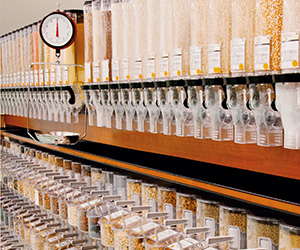Crystal Espin investigates why there’s a sudden increase in the number of people cutting gluten from their diets
 Should we or should we not be cutting gluten out of our diets? What exactly is gluten, anyway? Having the correct information at your fingertips can help you have a healthier future.
Should we or should we not be cutting gluten out of our diets? What exactly is gluten, anyway? Having the correct information at your fingertips can help you have a healthier future.
Basically, gluten is a protein found in wheat, rye, barley and processed foods such as pasta, bread and cereal. While gluten itself may have scant nutritional benefits, the wholegrains that contain gluten are rich in minerals and vitamins and are packed with essential fibre, and form part of a healthy diet that could help to lower heart disease, diabetes and some types of cancer.
But gluten can be harmful to those with coeliac disease, an autoimmune disorder in which the small intestine is hypersensitive to gluten, leading to a difficulty in digesting it and resulting in abdominal pain, bloating, nausea and diarrhoea. It’s often under-diagnosed, but in some countries, the incidence can be as high as 1 in 200 (Sweden) or low enough to be negligible (Japan).
In SA, the numbers haven’t yet been ascertained, but some professionals think it is probably under-diagnosed.
Tipping the scales
In 2008, Oprah Winfrey gave up gluten as part of a ‘cleanse diet’ and so began the ever-popular trend of cutting out gluten-containing products.
Today, many consumers are under the mistaken impression that following a gluten-free diet will boost health and energy, and help you lose weight. Some are even linking it to autism and other medical conditions.
Wrong! The majority of responsible health experts, dietitians and physicians have refuted these claims.
Nonetheless, there is a lot of support for the concept of eating less gluten in an effort to eat fewer processed foods, or to help you eat fewer carbohydrates and more protein, fruit and vegetables.
Those in the know also strongly advise against substituting gluten-free products for similar gluten-containing products. Many gluten-free products are much higher in carbohydrates and sodium, and lower in fibre, magnesium and protein than some of their gluten-containing counterparts.
Consuming these products without a real medical need could well result in weight gain and further health issues down the road.
If you decide to follow a gluten-free diet plan, opt for naturally gluten-free whole-grains such as millet, brown and wild rice, quinoa, and legumes such as lentils and chickpeas.
Sense or sensitivity?
Matthew Ballenden, a health-food specialist and owner of the popular Fresh Earth Food Store in Joburg, says proper gluten-free eating is neither a whim nor dangerous, but rather a way of life. He fully supports the gluten-free lifestyle, but agrees that mass-produced gluten-free products should be avoided in favour of the natural alternatives.
Matthew, a trained chef, claims he has benefited from the lifestyle change and thus decided to open what he says is the first 100% gluten-free bakery in South Africa. He believes that cutting out gluten is not just for people who suffer from coeliac disease. More and more people are now discovering that they just don’t feel good when they eat gluten, and that cutting it out can help them relieve the symptoms of allergic conditions such as rhinitis and eczema, says Matthew.
But what could have given rise to this apparently sudden increase in gluten sensitivity among consumers? Many gluten-free supporters speculate that it could have some-thing to do with the way food is produced and bought in the modern age. They feel there is a disproportionate focus on manufacturing food products only for profit, not for nutrition.
Another factor is that consumers aren’t paying attention to what they are putting into their bodies. You can find gluten in everything from frozen vegetables and soy sauce to certain medication, as well as most processed meats and sweets.
Add to that, heavily processed and mass-manufactured breads and cereals are often full of additives, preservatives and excess sugar that could be at the root of all sorts of new-found allergies and intolerances.
Don’t self-diagnose
Deciding whether or not you should be following a gluten-free diet should never be left entirely up to your own judgement. If you feel you may have problems processing gluten, consult your doctor. They can then conduct the necessary tests and advise you on what you should be eating for your best health.
Warning signs
If you have any of the following symptoms, it may be a sign you have a gluten intolerance and should consult a doctor.
Digestive issues Problems with gas, bloating, diarrhoea and even constipation after consuming gluten
Keratosis pilaris Small bumps on the back of your arms that occur as a result of a fatty acid and vitamin A deficiency caused by gluten damaging the gut
Fatigue Feeling tired owing to too few carbohydrates being absorbed
Frequent migraines Migraines and headaches, specifically after eating gluten
Joint pain Inflammation, swelling or pain in your joints such as fingers, knees or hips
Mood issues Anxiety, mood swings, depression and attention deficit hyperactivity disorder (ADHD)
Other illnesses Diagnoses of primary biliary cirrhosis, Type 1 diabetes, microscopic colitis, hypothyroidism or lupus.







